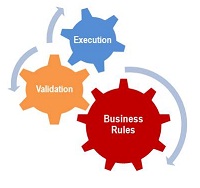Business rules engine

Business rules engine is a lightweight JavaScript library for easy business rules definition of the product, the contract, the form etc.
Business rules engine key features
The main benefit is that business rules engine is not tight to HTML DOM or any other UI framework. This validation engine is UI agnostic and that is why it can be used as an independent representation of business rules of a product, contract, etc. It can be easily reused by different types of applications, libraries.
- It enables to decorate custom objects and its properties with validation rules.
- It supports composition of validation rules, that enables to validate custom object with nested structures.
- It is ease to create your own custom validators.
- It supports asynchronous validation rules (uses promises).
- It supports shared validation rules.
- It supports assigning validation rules to collection-based structures - arrays and lists.
- It supports localization of error messages with TranslateArgs.
- It deploys as AMD, CommonJS or plain script module pattern.
- It offers basic build-in constrains validators. Other custom validators can be find in extensible repository of custom validators (work in progress).
Useful information
- Business rules engine - Tutorial
- Business rules engine - API
- Business rules repository - sources
- Business rules repository - API
- NodeJS Example
- AngularJS Example
- AngularJS Demo - Forms app
To create business rules for hobbies
The executive decided that they need information about all employees hobbies. You are selected as the best programmer to create the business rules.
Requirements
The executive requirements:
- each employee must give at least 2 hobbies, maximum hobbies is 4
- each hobby can have optional information about
- How often do you participate in this hobby
- Is a paid hobby
- Would recommend this hobby to a friend
- your firm has foreign employees - form must support czech, english and german languages
- the GUI should look like - Hobbies form
Define your business rules
It would be nice if there is a huge business rules repository and you can find your business rules. But back in reality, your business rules are too special so that you have to create you own hobbies business rules.
Describe data structure
First we try to describe what hobbies data we have to pick up from employees
- create data structure for hobbies data
/**
* Data structure for hobbies data.
*/
export interface IHobbiesData {
/**
* Person identification
*/
Person?:Shared.IPerson
/**
* The things you enjoy doing.
*/
Hobbies?:Array<IHobby>;
}- create hobby structure with all optional information
/**
* The things you enjoy doing.
*/
export interface IHobby
{
/**
* Description of your hobby.
*/
HobbyName?:string;
/**
* How often do you participate in this hobby.
*/
Frequency?:HobbyFrequency;
/**
* Return true if this is a paid hobby, otherwise false.
*/
Paid?:boolean;
/**
* Return true if you would recommend this hobby to a friend, otherwise false.
*/
Recommedation?:boolean;
}- create options for hobby frequency
/**
* How often do you participate in this hobby.
*/
export enum HobbyFrequency {
Daily, Weekly, Monthly
}Define business rules
To define new business rule for an object, you have to create abstract validator. You can assign some constraints (required,maxlength,email, etc.) to properties of an object.
- create validator for person object
private createPersonValidator():Validation.IAbstractValidator<Shared.IPerson> {
//create custom composite validator
var personValidator = new Validation.AbstractValidator<Shared.IPerson>();
//create validators
var required = new Validators.RequiredValidator();
var email = new Validators.EmailValidator();
var maxLength = new Validators.MaxLengthValidator();
maxLength.MaxLength = 15;
//assign validators to properties
personValidator.RuleFor("FirstName", required);
personValidator.RuleFor("FirstName", maxLength);
personValidator.RuleFor("LastName", required);
personValidator.RuleFor("LastName", maxLength);
personValidator.RuleFor("Email", required);
personValidator.RuleFor("Email", email);
return personValidator;
}- create validator for hobby object
private createItemValidator():Validation.IAbstractValidator<IHobby> {
//create custom validator
var validator = new Validation.AbstractValidator<IHobby>();
var required = new Validators.RequiredValidator();
validator.RuleFor("HobbyName",required);
return validator;
}- compose both created validators to one main validator
- create custom constraint for minimum and maximum number of hobbies
private createMainValidator():Validation.IAbstractValidator<IHobbiesData> {
//create custom validator
var validator = new Validation.AbstractValidator<IHobbiesData>();
validator.ValidatorFor("Person",this.createPersonValidator());
validator.ValidatorFor("Hobbies",this.createItemValidator(),true);
var hobbiesCountFce:Validation.IValidate = function(args:Validation.IError){
args.HasError = false;
args.ErrorMessage = "";
if (this.Hobbies === undefined || this.Hobbies.length < 2){
args.HasError = true;
args.ErrorMessage = "Come on, speak up. Tell us at least two things you enjoy doing";
args.TranslateArgs = {TranslateId:'HobbiesCountMin', MessageArgs:this.Hobbies.length};
return;
}
if (this.Hobbies.length > 4){
args.HasError = true;
args.ErrorMessage = "'Do not be greedy. Four hobbies are probably enough!'";
args.TranslateArgs = {TranslateId:'HobbiesCountMax',MessageArgs:this.Hobbies.length};
return;
}
};
validator.Validation({Name:"HobbiesCount",ValidationFce:hobbiesCountFce});
return validator;
}- create method that executes all business rules
/**
* Executes all business rules.
*/
public Validate():Q.Promise<Validation.IValidationResult> {
this.MainValidator.ValidateAll(this.Data);
return this.MainValidator.ValidateAsync(this.Data);
}Look at the API documentation.